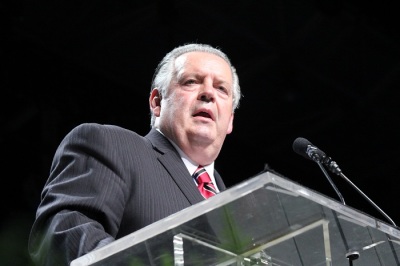Will 'in-country' migration turn Texas blue?
Increasingly large numbers of statisticians, analysts, reporters and politicians have noticed, and are noticing, a significant and swelling internal migration of native-born Americans moving from certain sections of the country to other regions.

In some ways, it is the most significant “in-country” migration of population since the great Western frontier expansion of the country in the last half of the 19th century. Unlike the great shifts of population initiated by the Great Depression of the 1930s (from the Midwest “Dust Bowl” to California in the 1930s, and the vast migration of rural southern blacks to the industrial Midwest and Eastern population centers at the same time), this migration is driven more by cultural and social forces rather than economic necessities.
California has been experiencing a domestic outmigration since 1991, according to the California Department of Finance. The Golden State had been an almost irresistible population magnet since the Gold Rush days of the mid-19th century. Almost from its establishment as a state, California has had a majority of residents who were from some place else other than California (born in another state or another country). In the 2010 Census, for the first time, native-born Californians emerged as a majority of the state’s residents.
In the 2020 census, California lost a congressional seat for the first time in its history. In contrast, Texas gained an additional two seats in the 2020 census after having already gained an almost unprecedented three additional congressional seats in the 2010 census.
New York and Florida had a similar dynamic, with record population decline in New York and rapid population growth in Florida due to migration.
Many political prognosticators have been predicting (or is it hoping?) that these population shifts will turn Texas, and Florida, purple, then full-blown blue, greatly enhancing Democratic political fortunes nationwide.
However, as this profound wishful thinking has congealed into predictions and analysis, the desired result seems less and less likely.
It is the Americans who are the most dissatisfied with the extremely progressive public policies of California and New York who are exercising their freedom to relocate to states where their cultural and economic philosophies are far more in sync with their own.
The evidence so far seems to rebut that prediction. For example, in the white-hot Texas senate race in 2018 between conservative firebrand Sen. Ted Cruz and flamboyant liberal lightning rod, Congressman Robert “Beto” O’Rourke, recent arrivals from California favored Cruz by a margin of 57% to 42%, while O’Rourke was favored by native Texans (51% to 47%).
Objectivity is usually greatly to be desired in commentators and reporters. However, personal insight and experience can be invaluable in seeking to analyze what is really going on. My background is a politically-active native Texan whose first “hands-on” experience was as a 15-year-old volunteer handing out flyers for Senator John Tower, who was elected in 1961 as the first Republican senator from a formerly confederate state since the end of Reconstruction in 1877.
From everything I know and have experienced about my native state (my great, great, great-grandfather and my great, great, great uncle fought together in the Texas War of Independence), Texas will not turn purple or blue.
The majority of the people who moved to Texas from another region of the country end up falling in love with its ambiance of individualism and its culture of “the sky is the limit!,” “Let’s go for it!,” and “ America is the greatest country in the world!”
In fact, one of the most popular bumper stickers statewide for many years in Texas has been “I wasn’t born here, but I got here as fast as I could!”
I, for one, cannot help but laud, honor and commend our founders for constructing a democratic, representative federal government of individual states that are allowed to develop different economic and cultural policies, where people can see and compare for themselves which one betters their lives and preserves their individual freedoms.
I read a cover story in The Economist (the British Time), two decades ago that predicted that America’s future would eventually be “California” or “Texas.” I would not bet against Texas.
Dr. Richard Land, BA (Princeton, magna cum laude); D.Phil. (Oxford); Th.M (New Orleans Seminary). Dr. Land served as President of Southern Evangelical Seminary from July 2013 until July 2021. Upon his retirement, he was honored as President Emeritus and he continues to serve as an Adjunct Professor of Theology & Ethics. Dr. Land previously served as President of the Southern Baptist Convention's Ethics & Religious Liberty Commission (1988-2013) where he was also honored as President Emeritus upon his retirement. Dr. Land has also served as an Executive Editor and columnist for The Christian Post since 2011.
Dr. Land explores many timely and critical topics in his daily radio feature, “Bringing Every Thought Captive,” and in his weekly column for CP.




























